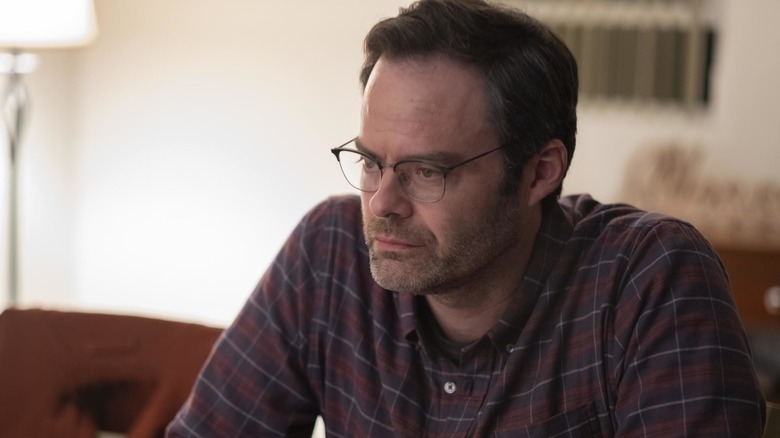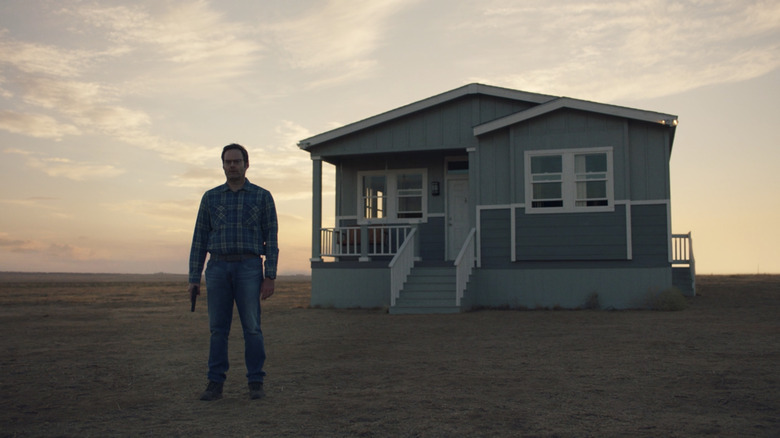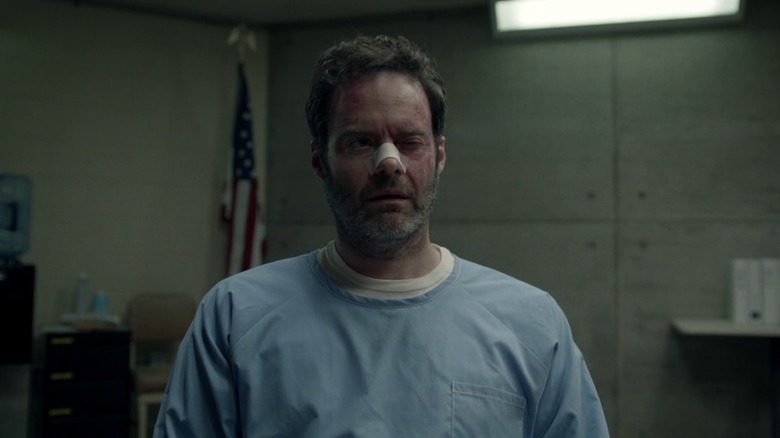How Barry Confronts His Darkness In Season 4 Episode 5
In a surrealist time-jumping twist, "Barry" leaps eight years into the future midway through the fourth and final season. The previously incarcerated hitman has turned fugitive and dragged his ex-girlfriend Sally to a new miserable life in what can only be described as the middle of nowhere. In his isolation, Barry is forced to confront the demons that have long lurked in his mind. But rather than work through the violent impulses that have always troubled him, he instead projects them into the outside world, trying desperately to shut the darkness out from his family — and himself.
Barry has gone from moonlighting as a hitman to a stiff-shirted stay-at-home dad. He's done a complete 180-degree pivot to stark Evangelicism, but it's not really about religion. Barry is trying to reconcile his violent past with the urge to protect his son from harm. He tries to live a life of purity to bathe his past and future sin in light.
The runaway murderer's life in exile is one of stark piousness, an interesting paradox. Barry turns isolating his wife and child from the outside world into a moral good. He fears that he or any part of his newly constructed world could succumb to darkness again, a fear that bubbles to the surface when he hears something in the dark and stands outside all night in it, waiting.
"This episode, to me, very clearly illustrates his psychology, which is, you know, I want to be a hero to my son, great men do bad things," series creator and star Bill Hader spoke about episode 5 on "The Prestige TV Podcast." "[A]nd then there's that knock on the door and it's the darkness waiting for him, and he's just like, 'No I'm gonna f***ing stare you down, you're not coming for this, I worked too — this is all I've wanted my whole life.'"
He spends all night holding the darkness at gunpoint
Religion is a big part of Clark aka New Barry's life. This newfound "heaven" he's achieved with Sally and their son, as Bill Hader described it to TVLine, must be preserved at all costs. "He can't really find redemption with anybody else, so he's turned to God for redemption... but again, I don't think he really understands religion," the series creator noted.
Barry manipulates religion and his newfound morality to justify taking extreme action to protect his family. Warding off potential intruders with a gun seems to be a normal part of their family life. When he hears a faint noise in the distance, he asks Sally to get in the bathtub as if he's telling her to grab milk on the way home. He also shields his son from engaging with other children. Worst of all, he appears to feel justified in plotting to kill Gene Cousineau so as to preserve his "safe place."
He's always been a bit of a madman, but now Barry has successfully shaped a little corner of the world in his own vision. He might not be able to redeem himself in the world's eyes, but he can make himself a hero in his son's eyes. "He's very much trying to paint the version of himself that he wants to be to his son," Hader explained. "How his son sees him is how he's always wanted to be seen by everybody."
The blinding light of their desert home is suffocating in itself, but the darkness, too, is encroaching on their lives — it always has been. NoHo Hank or one of Barry's other enemies could very well be on his tail, but the call of evil is coming from inside the house.
Was it all in Barry's head?
Barry emerges from the dark recesses of Sally's apartment, beaten and bruised, at the end of episode 4. He is at his most persecuted, having just escaped from prison, and he steps into the light of Sally's acceptance. Bill Hader confirmed that "darkness plays a huge part of the show," he told "The Prestige TV Podcast," and "especially this season this idea of the screen going completely black, things coming in and out of darkness[.]"
Once the serial killer emerges from his darkest moment, he would kill to avoid going back into it. He must protect the "heaven" he has created for himself, to keep the dark from creeping in. He only hears a laugh in the distance, and finds nothing — it's possible that nothing at all was out there. The noise in the darkness could have been a hallucination of Barry's or a purposefully abstract metaphor for the series. Either way, it speaks to Barry's fear of the malevolence of his own mind, projected outward.
"[I]t's kind of a theme and that, to me at least, that darkness is knocking at the door, it finds them even though they're out at this perfect place, and Barry effectively stares it down until daylight comes up," the lead actor explained.
Since the beginning of the series, Barry has clamored to escape his darkness. He wanted to quit being a hitman to become an actor in the very first episodes, to totally reform, but redemption has always eluded him. He will inevitably fall back into his old ways, and the things that go bump in the nighttime will close in on his little slice of heaven.


